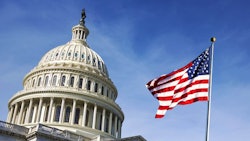
In September, the Hemp and Hemp-Derived CBD Consumer Protection and Market Stabilization Act of 2020 (H.R. 8179) was introduced to Congress in attempt to regulate cannabidiol (CBD) in dietary supplements. If passed, it would be the first non-medical CBD product to be approved and regulated by the U.S. Food and Drug Administration (FDA).
And while no tangible action has been taken on that bill since its introduction, U.S. Hemp Roundtable (USHR) has been working behind the scenes to gather the support of now 30 co-sponsors of the bill. The newfound support, as well as input from the FDA, has industry participants hopeful the bill will pass.
Jonathan Miller, general counsel for USHR, says gathering the new sponsors has been the result of both asking USHR members to send emails to their state representatives as well as holding virtual meetings with nearly 200 political offices across the country. The effort has resulted in bipartisan support: 18 of the bill’s sponsors are Democrats, while 12 are Republicans.
“While everyone is familiar these days with CBD, most members of Congress and their staffs are not familiar with all the nuances, what the FDA has done, what the FDA hasn’t done,” Miller says. “It’s been a real educational process, which makes the fact that we have 30 co-sponsors such a big deal. To take initiative is so complex and so nuanced.”
In addition to congressional support, the bill has also received support from more than a dozen industry organizations and nearly 50 companies, according to a white paper from U.S. Hemp Roundtable.
The bill includes a requirement for manufacturers to comply with existing regulations for dietary supplements, which include safety procedures, labeling requirements and Good Manufacturing Practices (GMP).
David Spangler and John Troup of the Consumer Healthcare Products Association (CHPA) say the FDA has provided guidance on the changes it would like to see in the bill, signaling the agency’s receptivity to the regulations. Among the FDA’s requested changes is setting an upper limit on the amount of CBD allowed per product. The FDA also wants to limit the bill to regulating only CBD in dietary supplements, leaving out minor cannabinoids and other hemp derivatives.
“I don’t know if that’s ideal, but that’s the single biggest ingredient right now, and it could certainly set a tone for how to think about other ingredients,” says Spangler, CHPA’s senior vice president of legal affairs and policy.
“The good news is [the FDA] supports … that CBD can be designated as a dietary supplement, and that new pathway can be established,” adds Troup, CHPA’s vice president for scientific affairs and dietary supplements.
Notably, the bill does not include regulations for CBD in any other product outside of dietary supplements. (From the FDA’s perspective, CBD is currently illegal in all products except Epidiolex, which is a drug used to treat epilepsy.)
Miller says this was an intentional move, as the FDA has objected to regulating CBD in products like food and beverages.
“The folks on [Capitol] Hill that we consulted felt like we should go at it in two steps—dietary supplements first, then food and beverage,” Miller says. “We support pathways for both dietary supplements and food additives, and we believe a bill next year will include a food and beverage path.”
Further Action Required
Miller says the bill has been put on pause as Congress works through other more pressing issues, including fiscal appropriations and the recent election. But once newly elected congressional members assume their positions, Miller expects action on the bill will pick back up in the beginning of 2021.
Miller points out that surveys have found the CBD market could grow from about $1 billion now to anywhere from $10-16 billion within the next five years. He adds that this bill would be the first step in achieving that level of growth.
“All those analyses say those higher-end estimates are only possible if there are favorable FDA regulations,” Miller says. “If we continue to remain with this regulatory uncertainty, we’re not going to see this type of growth.”
























